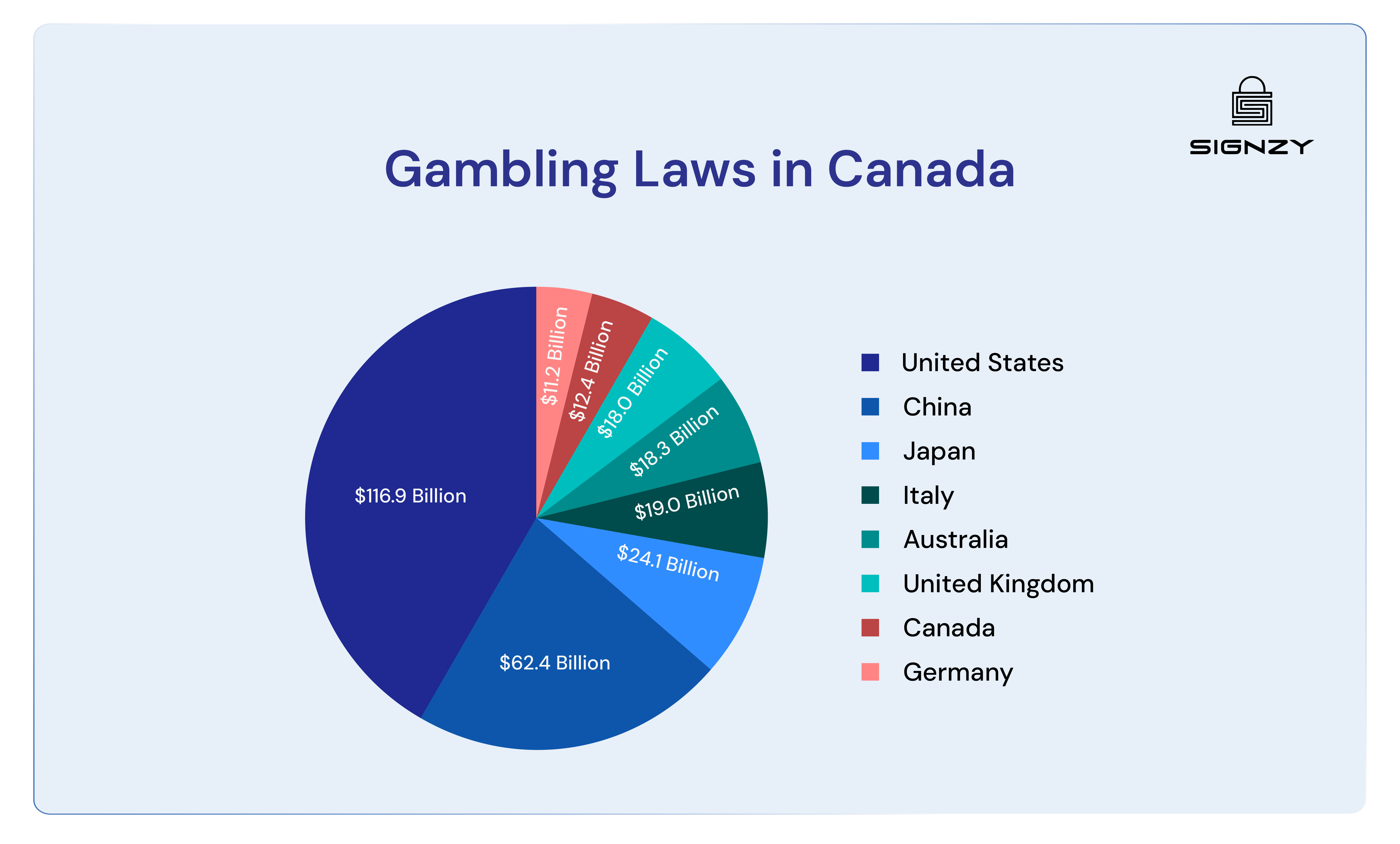[2025] Gambling Laws in Canada – Regulations, Provincial Requirements, and More
- Canada’s federal laws cover criminal code provisions and anti-money laundering requirements for gambling activities. On the other hand, provincial laws handle licensing, operational standards, taxation, and day-to-day regulatory oversight.
- Online gambling legality varies by province. Ontario has a regulated online market, while other provinces operate through government-run platforms or restrict online gambling to their own sites.
- All provinces require operators to implement responsible gambling programs, including self-exclusion options, spending limits, and problem gambling resources for customers.
Canada pulls in about $12.4 billion annually from gambling – not bad for a country with 38 million people, right?
To put that in perspective, it’s the North American continent’s second and overall world’s seventh biggest gambling market, only behind the U.S.
This $12.4 billion figure represents decades of stable regulation that’s created predictable operating conditions. Unlike newer markets still figuring out their approach, Canada’s gaming industry has refined its systems over time, making it an attractive market for operators looking for established revenue streams with clear compliance pathways.
Of course, knowing Canada’s market position doesn’t tell you how to operate within it. Let’s explore the main categories of gambling laws you’ll be working with.
💡 Related Blog:
Canada’s State of Gambling, Quick Overview
Canada’s legal approach to gambling has evolved slowly. While the original 1892 criminal code banned most betting as a moral offense, rules softened to permit charity lotteries in 1969.
The most significant shift occurred in 1985 when the federal government empowered the provinces to “conduct and manage” gambling within their borders.
This 1985 decision created the foundation for today’s system: a national framework with provincially controlled execution. This means there are three types of operators in the Canadian market:
- Government-run platforms
- Privately licensed operators (Only allowed in Ontario.)
- “Grey market” of offshore websites (not licensed but accessible to residents.)
Simply put, Ontario is the only Canadian province where gambling startups can operate direct-to-consumer services through a regulated private market. All other provinces require partnerships with government-operated lottery corporations as intermediaries.
Related Resources
Canada’s Key Federal Laws For Gambling Sector
While provinces manage most day-to-day regulation, there are four federal laws that set the stage for what is legal and how gambling businesses must handle their financial operations.
1. Criminal Code of Canada
Canada’s entire approach to gambling is built on foundational federal laws with a simple default setting: all betting is banned. The Criminal Code of Canada was designed to stop illegal lotteries and backroom bookies, so it sets a strict, nationwide prohibition on running any game of chance or betting house.
So, how is legal gambling possible at all?
The entire system exists because of an exception carved out in Section 207 of the Code.
This section gives each province the exclusive authority to “conduct and manage” what the law calls a “lottery scheme.” That term has been interpreted very broadly over time to cover everything from casino games and slot machines to online sportsbooks. This creates the unique system we see today.
2. Bill C-218 (Safe and Regulated Sports Betting Act)
This piece of federal legislation passed in 2021 expanded the existing gambling framework by amending Section 207 of the Criminal Code.
Before this bill, legal sports betting in Canada was very limited. Bill C-218 repealed subsection 207(4)(b), which previously required single-event betting to be conducted through pari-mutuel pools. The bill simply gave each province the authority to decide for itself how to offer and regulate single-game betting.
3. FINTRAC Oversight and Reporting
The agency running the show isFINTRAC, Canada’s financial intelligence unit. They don’t watch every transaction themselves; instead, they rely on clues sent from businesses on the front lines.
Under the law, your gaming platform is considered a “reporting entity.” This means you are legally required to be one of those sources on the front line.
Your main job is to flag two specific things:
- Big Cash Deals: Any cash coming in that totals CA$ 10,000 or more in a 24-hour window needs a report.
- Suspicious Activity: You have to report any transaction, regardless of the amount, that just doesn’t feel right. If a user’s financial activity seems designed to hide something or has no logical explanation, you have to flag it.
With that said, let’s now look at Canada’s provincial gambling regulations.
Provincial Regulations
We’ll walk through Ontario’s regulatory framework first, then take a quick look at what you’re dealing with in the government-controlled provinces.
Ontario (iGaming Ontario Model)
Launched in April 2022 and managed by iGaming Ontario, the model allows private companies to apply for licenses and compete for customers.
Operators here must follow strict rules from the Alcohol and Gaming Commission of Ontario (AGCO) on everything from advertising to player protection.
To operate, private companies must:
- Get Licensed by the AGCO: Before applying, companies need a certificate from an Independent Testing Laboratory for their gaming devices.
- Sign an Agreement with iGaming Ontario: This involves signing an NDA, completing AML and financial submissions, and systems readiness checks before executing the final Operating Agreement.
- Pay Required Fees: Gaming operators must pay an annual fee of CA$ 100,000 for each gaming website. Gaming-related suppliers pay between CA$3,000 and CA$15,000 annually.
Other Provinces
Most other provinces have a unique, government-controlled monopoly on gambling, with different regulators and rules.
The table below breaks down the specific regulators and legal platforms for each market.
| Province | Key Regulator(s) & Governing Act | Market Model | Legal Online Platform(s) |
|---|---|---|---|
| Quebec | Regie des alcools, des courses et des jeux (RACJ) & Loto-Québec under the Act Respecting Lotteries… | Government-run Monopoly | EspaceJeux |
| British Columbia | GPEB under the Gaming Control Act of 2002 | Government-run Monopoly | PlayNow |
| Alberta | AGLC | Monopoly (moving to hybrid) | PlayAlberta.ca |
| Manitoba | Manitoba Liquor & Lotteries under The Liquor, Gaming and Cannabis Control Act | Government-run Monopoly | PlayNow |
| Saskatchewan | Saskatchewan Liquor and Gaming Authority under The Alcohol and Gaming Regulation Act, 1997 | Government-run Monopoly | PlayNow |
| New Brunswick | Gaming Control Branch under the Gaming Control Act of 2008 | Government-run Monopoly (via ALC) | Pro-Line Stadium |
| Nova Scotia | Alcohol, Gaming, Fuel, and Tobacco Division under the Gaming Control Act | Government-run Monopoly (via ALC) | Pro-Line Stadium |
| Prince Edward Island | PEI Lotteries Commission under the Lotteries Commission Act | Government-run Monopoly (via ALC) | Pro-Line Stadium |
| Newfoundland & Labrador | Service NL | Government-run Monopoly (via ALC) | Pro-Line Stadium |
Compliance Requirements for Gambling Businesses
Now comes the fun part: actually staying compliant without going insane or broke. Here’s what you’re really signing up for.

1. AML Compliance
This is where most operators underestimate the workload. You’re not just checking IDs anymore – you’re basically becoming a financial detective agency.
You’ll need someone monitoring transactions 24/7, looking for suspicious patterns. Is that crypto whale dropping $50K? You better have documentation on where that money came from. The player whose betting patterns suddenly changed? Time for enhanced due diligence.
2. Responsible Gambling
You need RG Check accreditation, which sounds straightforward until you realize you’re basically redesigning your entire operation around player protection.
Your customer service team needs training to spot problem gambling signs – and I mean real training, not some 30-minute online course. They need to know when to intervene and how to do it without losing the customer entirely. It’s a delicate balance between “we care about you” and “please keep playing.”
3. Data Security
If you think AML is intense, wait until you dive into cybersecurity requirements. You’re handling financial data, personal information, and payment details – basically, a hacker’s dream buffet.
You need encryption for everything, regular penetration testing, incident response plans, and staff training to avoid phishing attacks.
Oh, and if there’s a breach? You’ve got 72 hours to report it or face the regulatory wrath.
I know one operator who got hit with a ransomware attack and lost their license because their incident response was a disaster. Don’t be that guy.
4. Identity Verification Requirements
In Canada (especially Ontario), you are required to verify your users by asking for government documents, recent photos, and liveness verification during registration. That’s a lot of paperwork if you’re doing it by hand.
Your compliance team can’t realistically review that many documents without serious delays, and players won’t wait three days to start playing.
But instead of hiring an army of compliance officers, you can plug into verification services that can process documents and automatically cross-check against Canadian credit bureaus.
And if you are looking for such scalable solutions, Signzy’s KYC verification APIs can do the heavy lifting for you.
To know more about how Signzy can help, book a demo here.

Shivam Agarwal
Shivam works in the Founder’s Office at Signzy, where he drives cross-functional initiatives that align strategy, growth, and execution. With over 5 years of experience across consulting, venture capital, and fintech, he brings a well-rounded perspective to solving complex business challenges. Shivam has also cleared all three levels of the CFA Program, further strengthening his expertise in financial analysis, investment strategy, and data-driven decision-making.

![[2025] Gambling Laws in Canada – Regulations, Provincial Requirements, and More](/simg/images/blrzl70g/production/76648855be6266f5db81d33b3d0d2b57e30c4eac-2816x662.png)
